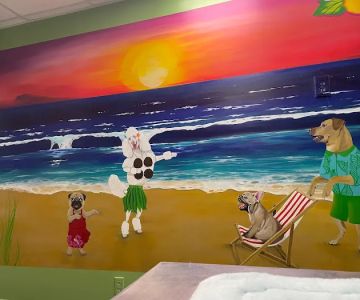A Day in the Life of a Veterinarian: What You Can Expect
As someone who's always been passionate about animals, the idea of becoming a veterinarian had always intrigued me. Little did I know, the life of a vet is much more dynamic and complex than I had ever imagined. I want to take you through a typical day in the life of a veterinarian, sharing what I’ve learned and experienced firsthand in this rewarding career.
1. Early Morning Rush
The day usually starts early for most veterinarians. For me, the alarm goes off at 5:30 AM, and it's time to get ready for a busy day at the clinic. The first thing I do is check my schedule to see what cases are lined up for the day. From routine checkups to emergency surgeries, a veterinarian's day is never predictable. It's not just about caring for animals—it's about preparing mentally for everything that could come your way.
1.1 Preparing for the Day
After I get to the clinic, I review any notes from the previous day, check in with the team, and prep for appointments. The clinic may have already received calls from pet owners needing urgent care or consultation. It's important to have everything organized so that the day flows smoothly. Most mornings involve a lot of behind-the-scenes work—making sure equipment is sterilized, medications are stocked, and cases are documented properly. Having a well-oiled routine makes all the difference when the day gets busy.
2. Treating Animals: The Heart of the Job
Once the clinic opens, it’s time to see patients. A typical day involves seeing a variety of animals, from dogs and cats to exotic pets like birds and reptiles. Each case is different, and the treatment approach varies based on the species, age, and specific needs of the animal. For example, one appointment may involve vaccinating a puppy, while another may involve a more complex surgery, such as a tumor removal or an orthopedic procedure.
2.1 Routine Checkups and Preventative Care
Routine checkups are a staple of a veterinarian's daily schedule. These appointments are an opportunity to catch up on preventive care, including vaccinations, flea and tick treatments, and general wellness exams. Many pet owners bring in their animals annually for checkups, so it’s a great way to ensure the animals are healthy and that any issues are caught early on. I always take the time to educate pet owners on nutrition, exercise, and overall health to prevent future health issues.
2.2 Emergencies and Urgent Care
In addition to scheduled appointments, veterinarians often handle emergency cases. These can range from animals injured in accidents to sudden illnesses. I’ve had moments where I’ve had to make split-second decisions, sometimes with life-or-death outcomes. These emergency situations are what make the job both challenging and rewarding. The adrenaline of saving an animal's life is one of the most fulfilling aspects of being a vet.
3. The Challenges of Being a Veterinarian
Being a veterinarian is undoubtedly rewarding, but it’s not without its challenges. One of the hardest parts of the job is dealing with the emotional stress that comes with seeing animals in pain or even having to euthanize a beloved pet. Every veterinarian experiences these moments differently, but it’s an inevitable part of the job. It’s not always easy to find the right words for pet owners during these difficult times, but offering empathy and compassion is essential.
3.1 Balancing Emotions and Professionalism
Throughout the day, it’s essential to balance emotional empathy with professionalism. In moments when a pet is facing a severe illness or injury, it can be emotionally taxing. I have to put my feelings aside and focus on what’s best for the animal and their family. It’s important to be strong for the pet owners, offering them support and guidance, even during the most difficult decisions.
3.2 Physical and Mental Fatigue
The physical demands of the job can also take a toll. Whether it’s standing for long hours during surgeries, lifting heavy animals, or rushing between rooms to see multiple patients, the physical aspect of the job can be exhausting. But it’s not just the physical demands—being a veterinarian is mentally taxing as well. It requires focus, problem-solving, and the ability to stay calm under pressure. Over time, I’ve learned to manage my stress and find ways to recharge after long, demanding shifts.
4. The Rewards of Being a Veterinarian
Despite the challenges, the rewards of being a veterinarian far outweigh the difficulties. Every time I see an animal recover from illness or injury, or when I watch a family’s joy as they take home their healthy pet, I am reminded of why I chose this career. There’s nothing quite like the bond between an animal and their owner, and being part of that relationship is incredibly special. I have had the privilege of working with amazing pets and families, and that keeps me motivated each day.
4.1 Building Long-Term Relationships
One of the most rewarding aspects of being a vet is building long-term relationships with both animals and their families. Over the years, I’ve cared for some pets from their first vaccinations to their senior years. The trust that pet owners place in me is something I value deeply. They rely on my expertise to help them make decisions about their pets’ health and wellbeing, and it’s incredibly fulfilling to be part of their journey.
4.2 The Joy of Helping Animals
Ultimately, the reason I became a veterinarian was to help animals. Every time I see an animal who has been suffering start to feel better, it’s an immense source of satisfaction. Whether it's a routine vaccination, a complex surgery, or an emergency rescue, I know I’ve made a real difference. The ability to directly impact the lives of animals and their owners is what keeps me passionate about this career.
5. Continuing Education and Career Growth
As a veterinarian, learning never stops. The field of veterinary medicine is constantly evolving with new treatments, technologies, and research. That means that I must continue my education and stay up-to-date with the latest advancements. Many veterinarians choose to specialize in specific areas, such as surgery, cardiology, or dermatology, which requires further training. For me, this constant learning is one of the most exciting aspects of the profession—it’s always evolving, and so am I.
5.1 The Importance of Professional Development
Throughout my career, I’ve attended workshops and conferences to improve my skills. Networking with other veterinary professionals and learning from their experiences has been invaluable. It’s essential to stay connected to the veterinary community to share knowledge and continue growing in this field.
5.2 Specialization and Career Opportunities
Some veterinarians pursue further specialization in specific areas, such as small animal care, exotic pets, or large animal practices. This specialization allows them to become experts in a particular field, but it also opens up new career opportunities. Whether you want to focus on surgery, emergency medicine, or even research, there are countless ways to grow and advance as a veterinarian.











